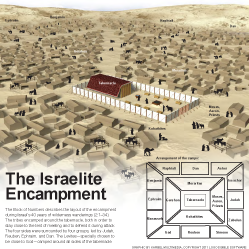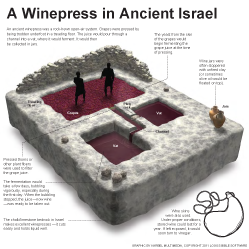49:1–27 Commonly referred to as the “Blessing of Jacob,” this chapter actually contains a mixture of blessings and curses on his 12 sons who essentially function as the eponymous (or name giving) ancestors of the 12 tribes of Israel (compare note on 48:1–22). Chapter 49 does not follow the birth order of Jacob’s children found in chs. 29–30. In chs. 29–30, Zebulun is the 10th son overall (the sixth and last son by Leah). Jacob also blesses Zebulun before Issachar, though Issachar was born before Zebulun (30:17–20); this inversion also occurs in Deut 33:18. |
49:1 what will happen with you in days to come Jacob’s blessings and curses speak about the distant future of the 12 tribes of Israel. In this way, his words in ch. 49 function prophetically.
49:3 excelling in power Reuben’s preeminence stemmed from his status as the firstborn. Here, this status is forfeited.
49:4 you shall not excel Jacob demotes Reuben for his immorality. While sexual immorality in certain contexts may not have merited such a demotion—as Judah is not demoted for his actions with Tamar (ch. 38)—but Reuben’s actions had dishonored his father and were an attempt to usurp his fathers’ leadership of the tribe (see note on 35:22).
49:5 weapons of violence are their swords References the murder of the men of Shechem (see ch. 34). Simeon, Jacob’s second son, would have been next after Reuben (v. 4) to inherit the blessing. Instead, his actions at Shechem nullify his status.
49:6 Let not my person be joined to their company Jacob formally dissociates himself from the evil of Simeon and Levi.
they hamstrung cattle A hamstrung ox would not be able to plow fields or carry water, threatening the subsistence of the female survivors of the massacre at Shechem. This detail is not included in Gen 34.
49:8 your brothers shall praise you Judah takes preeminence since Jacob’s first three sons—Reuben, Simeon, and Levi—were dismissed from the blessing normally given to the firstborn.
The sons of your father The other brothers or tribes.
49:9 a lion An ot metaphor for strength and cunning. The epithet “lion of Judah” (Rev 5:5) derives from this blessing. Since Micah 5:2 associated Judah with the coming of the ruler of Israel, the lion of Judah became a messianic motif as well.
49:10 the ruler’s staff between his feet Translation of this verse (and thus its meaning) varies considerably among English versions due to differences in manuscript readings, such as the division of the consonants into words.
49:11 donkey to the vine The animals listed in this verse here would trample any vine to which they were tied. The image suggests that the land of Judah will be so lush and productive that losing vines in this manner will be no cause for concern.
he washes his clothing in the wine This image is intentionally absurd: Only incredibly wealthy people would have so much wine that they could even wash garments in them if they desired.
49:12 the teeth whiter than milk With its expressions of striking beauty—sparkling eyes and blazing white teeth—this image conveys that no place or people in Canaan would compare with those in Judah.
49:13 the sea It is difficult to know why Zebulun is connected to the sea here, since none of the territory of Zebulun touched the Mediterranean. (Josh 19:10–16). This could mean that the reference to the sea here is to the Sea of Galilee, which the tribe of Zebulun was near.
Sidon Zebulun’s territory did not border the Phoenician city Sidon. However, here Sidon may refer to the nation of Phoenicia as a whole, as Zebulun’s territorial boundaries were adjacent to Phoenicia.
49:14 a strong donkey The Hebrew expression used here seems to refer to physical strength. The descriptions that follow in the remainder of this verse and Gen 49:15 likely mean that, despite being known for strength, Issachar would be more content not working.
49:15 a servant of forced labor Used elsewhere in the ot to refer to conscripted labor (Exod 1:11; Josh 16:10).
49:16 shall judge his people The Hebrew verb used here, dayan, is a wordplay on Dan’s name. Compare note on Gen 30:6.
49:17 a serpent The Hebrew word used here, nachash, is the same term used in ch. 3 for the primeval enemy of Adam and Eve. This means that Jacob is recharacterizing what Dan’s name means—he will act as accuser, not one who delivers proper judgment or justice. This is reflected in the later reputation of the tribe of Dan (see note on 30:6).
and Eve. This means that Jacob is recharacterizing what Dan’s name means—he will act as accuser, not one who delivers proper judgment or justice. This is reflected in the later reputation of the tribe of Dan (see note on 30:6).
49:19 Bandits shall attack Gad With its tribal inheritance located east of the Jordan River, Gad regularly had problems with Ammonites, Moabites, Arameans, and an assortment of other seminomadic groups. This phrase also highlights Gad’s small size.
49:20 Asher’s food is delicious The Hebrew expression used here probably refers to a reputation for fine food; however, it could be unflattering. In Judges 1:32, the tribe of Asher is living among enemy Canaanites, indicating that they could be providing fine food for enemy people groups.
49:21 English translations of this verse vary considerably, since some of the words are homographs (words that are spelled like other words, but have different meanings); this allows for substantially different interpretations of the Hebrew text. While the first part of the verse seems to refer to flourishing, it is unclear whether Jacob’s words to Naphtali are ultimately positive or negative. |
49:22–26 The ambiguous and cryptic nature of the Hebrew text of these verses makes interpretation difficult; Jacob could be referring to Joseph positively or negatively, or both. |
49:22 Joseph Jacob’s enthusiastic blessing of Joseph is the longest, except for Judah’s. Joseph’s two sons, Ephraim and Manasseh, are blessed in Joseph; the later blessing of Moses (Deut 33:13–16), which references the two tribes and Joseph, recalls the language used in this blessing.
the bough of a fruitful vine The Hebrew phrase used here, ben porath, could refer to a “fruitful vine” (or “fruitful bough”) or a “wild donkey” (or “wild colt”). Genesis 49:21 uses animal imagery, and vv. 23–24 use military imagery, which may suggest that a translation referring to an animal is more fitting.
49:23 fiercely attacked Refers to Joseph’s trials.
49:24 This verse ascribes the success of Jacob to God, using various metaphors and titles for God to do so. |
his bow remained in a steady position Joseph did not retaliate violently against those who wronged him when given the chance.
the Mighty One of Jacob This divine title (avir ya'akov) occurs only four times in the ot (see Isa 49:26; 60:16; Psa 132:2, 5; compare “Mighty One of Israel” in Isa 1:24).
the Shepherd Shepherd imagery for God and rulers is found throughout the ot (e.g., Num 27:17; 2 Sam 5:2; 1 Kgs 22:17; Ezek 34:23; 37:24).
the Rock of The Hebrew word used here is even. God is elsewhere referred to as the Rock (tsur) of Israel (2 Sam 23:3; compare Isa 30:29). God is also described as a rock (tsur) in several other passages (Deut 32:4, 15, 31; Psa 89:26; Isa 17:10; 44:8).
49:25 the God of your father The word for “God” here is el. This title ties the patriarchal generations together in covenant with Yahweh.
49:27 Benjamin is a devouring wolf Given the portrayal of young Benjamin in the Joseph story (Gen 43–45), this description is unexpected. However, it fits later events. For example, in the book of Judges troops from the tribe of Benjamin are described as experts with the sword and sling (Judg 20:15–25).
49:28–33 Following Jacob’s blessings and curses, he gives instructions concerning his death and burial. His death causes anxiety for Joseph’s brothers—which they express in ch. 50. The end of ch. 49 leaves the reader unsure of how things will turn out. |
49:29 am about to be gathered to my people A phrase that occurs only in the Pentateuch. See note on 25:8.
the field of Ephron the Hittite See 23:10–17.
49:30 the field of Machpelah See 23:17–19; 25:9.
Mamre See note on 13:18; 18:1.
49:31 they buried Abraham and Sarah See 23:19; 25:9.
they buried Isaac and Rebekah The burial places of Rebekah and Leah have not been previously mentioned in Genesis. See 35:29.
49:33 he drew his feet up to the bed The precise meaning and origin of this phrase is unknown.

|
About Faithlife Study BibleFaithlife Study Bible (FSB) is your guide to the ancient world of the Old and New Testaments, with study notes and articles that draw from a wide range of academic research. FSB helps you learn how to think about interpretation methods and issues so that you can gain a deeper understanding of the text. |
| Copyright |
Copyright 2012 Logos Bible Software. |
| Support Info | fsb |
 Loading…
Loading…




